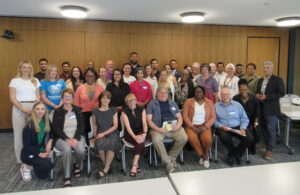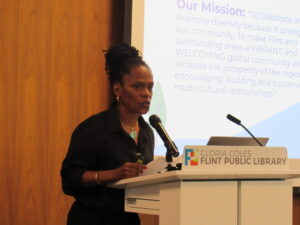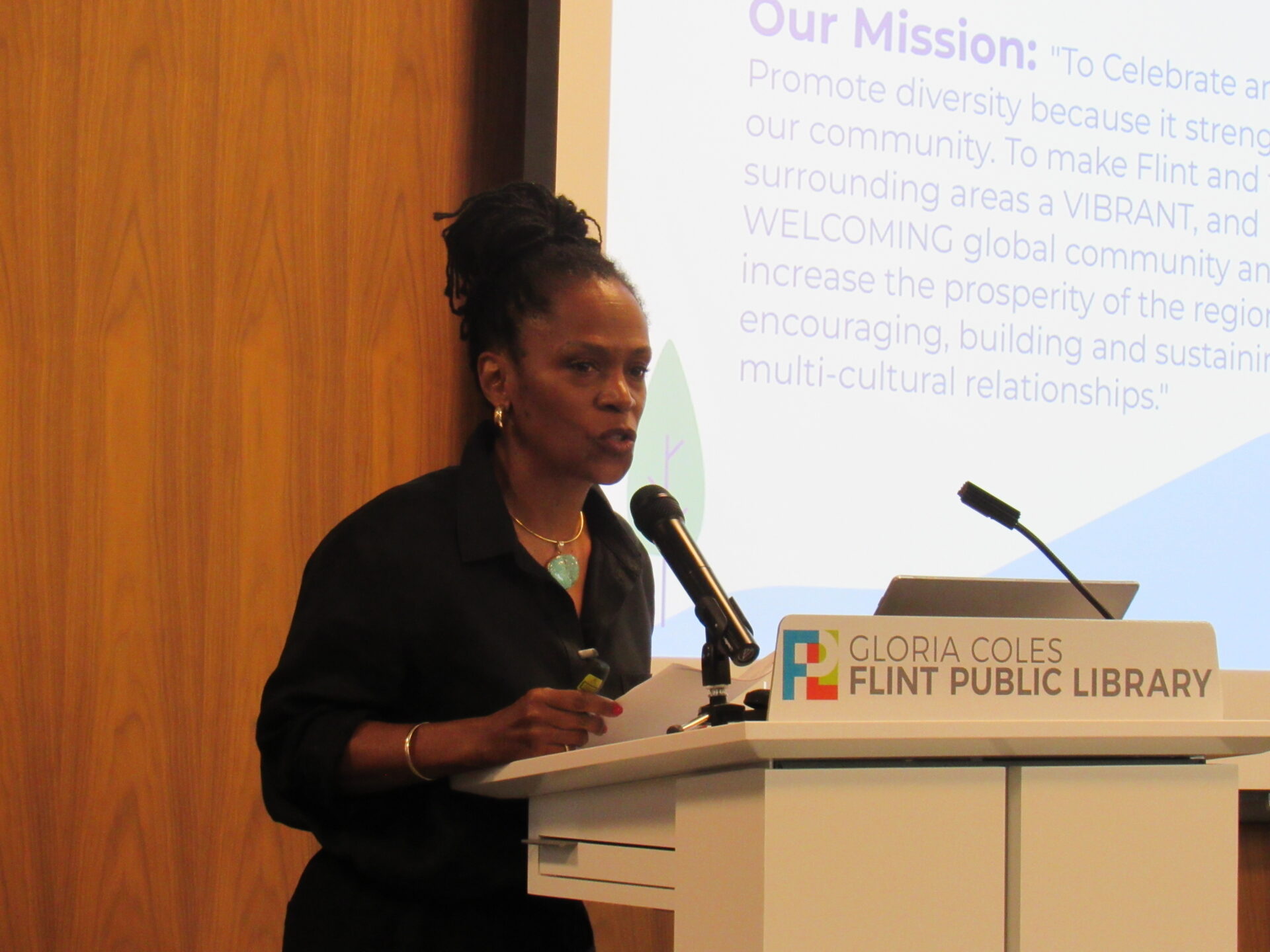By Harold C. Ford
On June 12, 2025, the International Center of Greater Flint (ICGF) revealed the findings of its roughly year-long study to determine the extent to which the Flint community is welcoming of immigrant populations.
Key findings of the study were presented to some 50 persons during a meeting at the Gloria Coles Flint Public Library by lead researcher Sasha Drummond-Lewis (Sociology, UM-Flint).
“Flint is already a multicultural community,” Drummond-Lewis began, with an estimated 10,000 to 11,000 immigrants living within Genesee County. Further, that population is increasing in number.
“Going back to the 1960s,” she said, “we saw the largest immigration to Flint over the last three years.”
Of the population surveyed as part of the study, 30 countries of birth were represented, with Cuba (26%), Mexico (11%), and India (10%) having the largest representation.
“More than 60 percent identify as first-generation immigrant,” Drummond-Lewis said, and two-thirds of those surveyed have children.
Drummond-Lewis also noted that the county’s immigrant population is “generally multilingual and literate” and that “work opportunities” represented the number one reason those surveyed gave for moving to the U.S. with “friends and family members” being the main reason they chose to move to the Flint community, specifically.
“Friends and family members [are] here already meaning they … are feeling some sense of belonging and allegiance to the area,” she said. Nonetheless, many of those surveyed about a sense of belonging were, according to Drummond-Lewis, “ambivalent, neutral, kind of in the middle.”
The lead researcher also noted that while 64 percent of those surveyed said they’d like to stay in Flint, 36 percent also said that they aren’t sure they will.
“We have an opportunity to support those who might want to stay,” Drummond-Lewis concluded. “There is room here to improve our services and to tailor them to the immigrants that are actually here.”
Global Flint Initiative
The ICGF research project, dubbed the Global Flint Initiative (GFI), was announced on March 5, 2024. Drummond-Lewis said its survey document was administered to 250 persons at over 25 locations in Genesee County over a six-month period from August 2024 to January 2025, and 201 surveys were deemed “usable.”
The 98-question “survey instrument,” according to Drummond-Lewis, was administered in three languages – English (102 surveys), Spanish (80), and Arabic (19).
Drummond-Lewis said the integrity of the survey and the process by which it was administered was reviewed and approved by the International Review Board, an organization whose purpose is “the protection of the rights and welfare of human research subjects.”
Drummond-Lewis was assisted by Jennifer Alvey (Anthropology and Women’s and Gender Studies, UM-Flint) and Emily Feuerherm (Linguistics, UM-Flint).
Other attendees at the June 12 report-out included representatives of government officials, educational institutions, nonprofits, social service agencies, and others.

Attendees pose at the Global Flint Initiative report-out meeting on June 12, 2025 at the Gloria Coles Flint Public Library. (Photo by Harold C. Ford)
“To celebrate and promote diversity”
Phyllis Sykes, ICGF co-founder and executive director, said that the organization’s purpose is “to celebrate and promote diversity because it strengthens our community.”

Phyllis Sykes, International Center of Greater Flint, CEO speaks at a report-out of the Global Flint Initiative on June 12, 2025. (Photo by Harold C. Ford)
“A vibrant and welcoming global community,” Sykes said, “increase[s] the prosperity of the region by encouraging, building, and sustaining strong and multicultural relationships.”
Sykes reminded attendees that the “Master Plan for a Sustainable Flint,” adopted in 2013, called for welcoming immigrants to the community “where long-standing Flint residents partner with their new neighbors – immigrants, returning veterans, and young professionals – to keep the community safe and welcoming to all.”
“We’re doing this through some really challenging times,” Sykes said. “Nonetheless, we will continue this work because we believe it’s important to this community.”
GFI’s 31-page report, dubbed “Creating a Welcoming Community,” was made public in the context of a nationwide debate over the status of immigrants in the United States. Drummond-Lewis said the ICGF survey “doesn’t show the effects of the new [Trump] administration.”
A recent report by the Brookings Institution titled “100 days of immigration under the second Trump administration” concluded the administration “has shifted nearly every aspect of immigration policy in the anti-immigrant direction … making life harder for immigrants living in the U.S.”
Nonetheless, a 2024 Pew Research Center study, based on U.S. Census Bureau data, found that the “United States has more immigrants than any other country” and that they “come from just about every country in the world.”
“We want to feel that we belong”
As the June 12 meeting concluded, three young immigrants briefly shared their experiences and thoughts on life in Flint and Genesee County.
Citing the scarcity of public transportation, Raquibul Islam said, “You have to have your own car.” Islam, a native of Bangladesh, relocated to China in pursuit of a bachelor’s degree, then moved to Flint and enrolled at Kettering University.
“One thing I want for the betterment of Genesee County is the development and the initiative for entrepreneurships,” declared Sameer Bharatan, also a Kettering University student. “We can make Flint as a global city.”
While the two young men spoke of what might improve their lives in the area, Lilian Hernandez, spoke positively and optimistically about her adopted home.
“In Flint I found a sense of belonging, a sense of safety,” she said. “We want to be a part of this community. We want to feel that we belong.”








You must be logged in to post a comment.